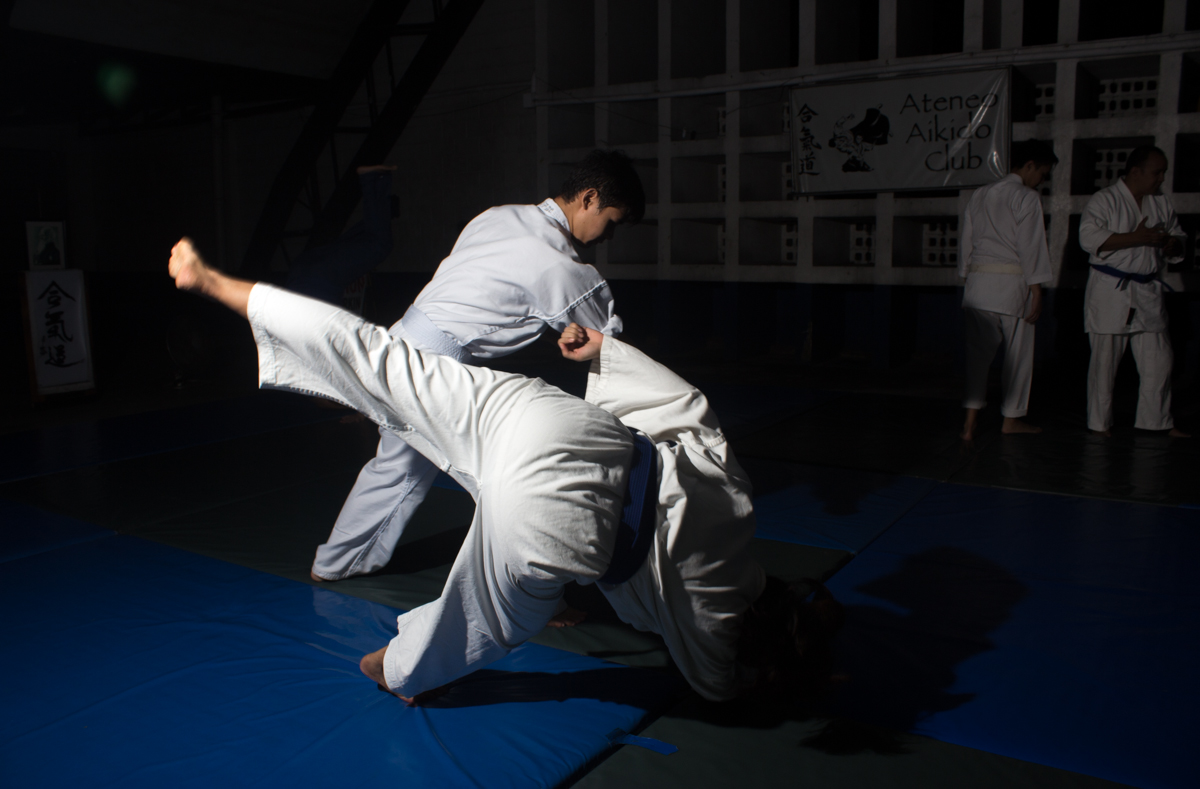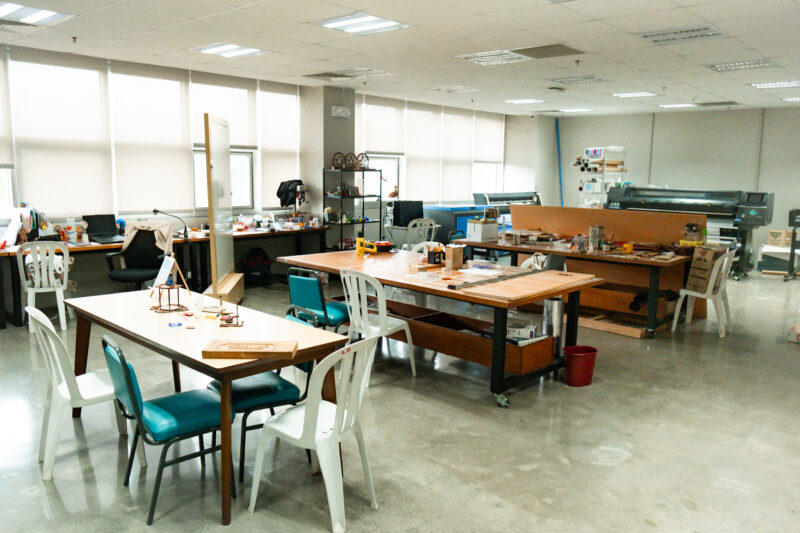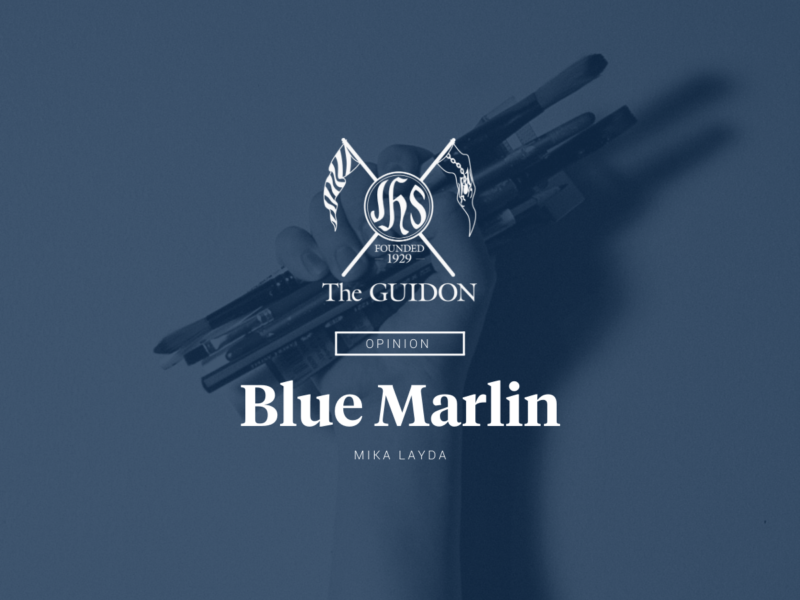TUCKED INTO a corner in the Blue Eagle Gym’s second floor, the Ateneo Aikido Club is quietly moving along, giving the aikidokas of the Blue and White a venue to practice their skills and share their interests within the Katipunan campus.
It all started 25 years ago at Cervini Hall, where dormers established the club under the leadership of English professor Antonio Ferrer, PhD. From there, the club moved around the campus, before finally settling in their current place, the Aikido Area, beside the University Athletics Office, complete with their own banner and mats.
Roy Agustin of the English Department says that the club’s membership is mostly comprised by faculty. “There are teachers and there are former teachers like Ada Loredo,” he says, referring to the only aikidoka who has been around since the club’s beginning.
The club boasts of three homegrown black belters. Prixie Cruz, PhD, also of the English Department, joined Loredo in earning her black belt at the same time and another professor from the School of Humanities, Mark Calano of the Philosophy Department, recently earned his own black belt.
What Aikido is
To the general public, not a lot is known about Aikido itself. The basic facts about Aikido are that it is a Japanese martial art and a method of self-defense. Its movements and technical structure were derived from the usage of a sword, but the techniques have evolved to the point where practitioners of the art can practice with an empty hand. They move in particular ways akin to dancing. All these give Aikido a certain distinctness compared to other forms of martial arts.
“We [do not] punch, we [do not] kick,” says Agustin. “A lot of the techniques involve locks, so you lock joints, you lock body parts, or throw. You [do not] hurt anyone, including your opponent,” he adds.
This martial art emphasizes against inducing physical harm to the opponent and this stems from the name itself. Aikido is composed of three Japanese words: ai, which means harmony; ki, which means spirit or energy; and do, which means path or way.
“It’s the way of harmony, supposedly. [It is] weird because [it is] often seen as the art of “not fighting.” How do you not fight, and yet protect and defend yourself? [That is] the weird and enigmatic thing about it,” Agustin explains.
Getting to know the Ateneo Aikido Club
There is one essential thing one must do in order to get into the club: show up. There is no sign up fee or registration process. If you want to practice Aikido, then just come and say you want to practice.
This membership process of accepting anyone, regardless of experience level, truly shows the friendly and open nature of the club. This is seen in the diversity of the club; a quick visit to their practices show members of different genders and ages interacting in jovial ways.
Not only is this in line with the traditions of the club itself, but also with the values the martial art upholds. Letting in anyone willing to practice is a way of harmonizing with others and the affability of the participants show the mutual respect that is important in Aikido.
There are some important people to know within the Ateneo Aikido Club if one wants to join. The three main instructors or sensei are Rommel Miel, Roni Boniquit, and Dennis Diaz. Aikido is a very personal martial art, so each sensei has a different style.
“Sensei Dennis has a very different way of practicing from let’s say, our Head Sensei Miel, because [Sensei Dennis] is an athlete,” Agustin explains. Despite having dissimilar movement, speed, and power in their style of practicing Aikido, neither one is wrong. The techniques used are still the same.
Below them are the aforementioned black belts: Ada Loredo, Prixie Cruz, and Mark Calano. These three can teach themselves, but they are not officially sensei. They can be asked to conduct if there is a lack of sensei or if they are running late. According to Agustin, the rule is if there are no sensei, then the highest-ranking belt conducts.
Going Beyond the Campus
One key philosophy of Aikido is an avoidance of competitions. Thus, the main avenue for interacting with other Aikido groups is through seminars. These are usually organized by a club that will invite an Aikido master from overseas to teach and gather aikidokas to practice together.
Similar to other martial arts, Aikido also has its own federation. Ateneo Aikido Club belongs to Aikido Philippines, the main federation in the country. However, when seminars are held, the federations usually come together. “Generally naman, there is no animosity between federations,” Agustin says. “You go to a seminar and you meet everybody.”
The Aikido Philippines Federation also aims to hold two National Aikido Conferences every year. For this, the federation usually invites masters from Japan. These masters usually have their own nuances in terms of style, which makes it interesting and non-repetitive to join every conference.
In relation to this, Ateneo Aikido Club has invited world-renowned Sensei Bruno Gonzales from France for a two-day conference on November 19-20, 2016 at the Blue Eagle Gym. This is the highlight of the club’s celebration of its 25th year since its beginnings in Cervini Hall.
Sensei Gonzales’ arrival to Manila is one of his rare appearances in Asia and the club has been sending out invites across the continent. “We’re also extending the invitation out international, so Singapore, Hong Kong, Japan, all these other areas,” Agustin says.
As a result, a large number of attendees from both the country and outside is expected to arrive for the Bruno Gonzales International Aikido Seminar. With a renowned sensei and a large gathering of multi-national aikidokas, it is certainly an event that is worthy to be held as the Ateneo Aikido Club’s flagship event in their silver jubilee celebrations this year.







